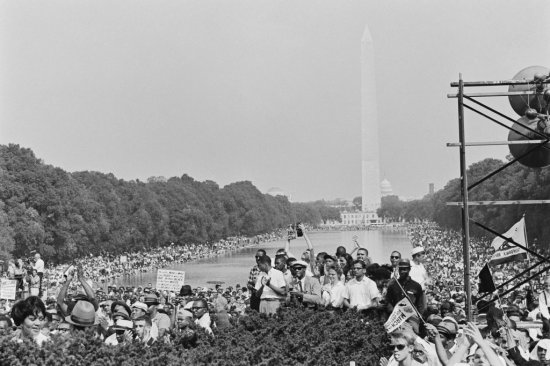
None of our communities will be safe until we are all safe. No one will be free unless all of us are free.
On August 28, 1963, the Rev. Dr. Martin Luther King Jr. delivered his famous “I Have a Dream” speech to more than 250,000 supporters gathered on the National Mall.
That day, Rabbi Joachim Prinz, a survivor of Nazi Germany, spoke just before Dr. King, and he reminded the audience that “the most urgent, the most disgraceful, the most shameful and the most tragic problem is silence.”
In the early 20th Century, despite their vastly different American experiences, Jewish and Black communities both faced identity-based violence, discrimination, ostracization and stereotypes. Racism and antisemitism were rampant.
[time-brightcove not-tgx=”true”]In April 1958, 54 sticks of dynamite were placed outside of Temple Beth-El in Birmingham, Alabama in a failed bombing attempt, just a few years before the 16th Street Baptist Church bombing in that same city took the lives of four young girls. In 1964, Jewish and African American volunteers Chaney, Goodman and Schwerner were murdered by members of the Ku Klux Klan.
While there’s been tremendous progress since those days, as civil rights and voting rights measures have since been signed into law and non-discrimination protections have been expanded, recent events have threatened to turn back the clock on that progress.
We have witnessed racism and antisemitism unleashed at the white supremacist rally in Charlottesville, white supremacist violence targeting the African American community in a racially motivated attack in Buffalo, and hate-motivated shootings at churches and synagogues, from the murder of nine worshippers inside the Mother Emanual AME Church in Charleston to the slaughter of 11 Jews inside the Tree of Life synagogue in Pittsburgh. There’s also the scourge of police violence and brutality against Black people—from George Floyd to Breonna Taylor to Daunte Wright.
The FBI’s annual hate crime data report consistently finds that anti-Black hate crimes make up the majority of race-based hate crime incidents—and the largest single portion of hate crimes overall—and anti-Jewish hate crimes make up well over half of all religion-based hate crimes despite the fact that American Jews represent a meager two percent of the entire U.S. population.
Since our founding in 1913, ADL long has believed that you can’t fight antisemitism without countering racism and hate against other groups. None of our communities will be safe until we are all safe. No one will be free unless all of us are free.
As prominent African American and civil rights leaders once again convene in Washington D.C. to mark the 60th anniversary of that march. As the CEO of ADL, I’m deeply honored to co-chair this important event. As a Jewish man whose family fled persecution in Europe and the Middle East, I couldn’t be prouder to address this gathering from the steps of the Lincoln Memorial, a symbol of the longstanding and continued struggle for freedom here in America. Indeed, this event is not intended as a commemoration of prior events; rather, it is a continuation of Dr. King’s work and the ongoing pursuit of his dream.
The Jewish community will be there in solidarity with our African American allies and partners. Not just for reasons of history—but for the common struggle we face together in today’s increasingly divided America. We will consecrate Shabbat by davening in the morning and then marching in the afternoon, essentially praying with our legs and locking arms as one throughout the day.
The Jewish and Black communities have had our differences over the years, but we have clear common ground in the fight against white supremacy, racism, and antisemitism. We have different histories but unmistakable traumas. There may be different stories but shared values. And African American Jews experience the intersection of those histories and stories. The March on Washington offers an opportunity to expand awareness of the incredible diversity within our communities, to highlight the common values we share, and to discuss the impact that antisemitism and other forms of bias continue to have on us all.
Together, we will call for a bold agenda for justice and for bringing an end to bigotry of all forms that includes stronger policies to combat, reduce and address hate crimes; protection of voting rights to ensure all have access to our basic tools of our democracy; and policies that ensure that the promise of economic prosperity and the American dream can be attained by all.
We will show the entire country that silence is not an option. Powerful, transformative change can happen when our communities come together. And, to invoke Dr. King on that historic day, ”Now is the time to make real the promises of our democracy… Now is the time to make justice a reality for all of God’s children.” Now is the time to realize Dr. King’s dream.
Jonathan Greenblatt is CEO and National Director of the ADL (Anti-Defamation League).
TIME Ideas hosts the world's leading voices, providing commentary on events in news, society, and culture. We welcome outside contributions. Opinions expressed do not necessarily reflect the views of TIME editors.